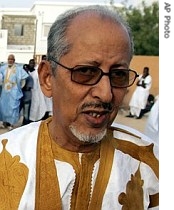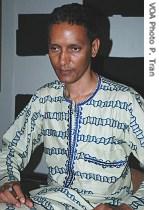2007年VOA标准英语-Mauritania Makes Slavery a Criminal Offense
搜索关注在线英语听力室公众号:tingroom,领取免费英语资料大礼包。
(单词翻译)
By Phuong TranDakar
09 August 2007
Mauritania's legislature has approved a law that will criminalize slavery. Anti-slavery lobbyists say enforcement will determine if this law can end slavery in the West African country where it has continued despite earlier bans. Phuong Tran has more from VOA's West Africa Bureau in Dakar.
 |
| President Sidi Ould Cheikh Abdellahi |
The newly-elected president told VOA this law has a better chance to end slavery than previous attempts.
The president says the government will be vigilant1 in enforcing the law, which for the first time, punishes acts of slavery with jail time and fines. He adds it is now illegal for officials who know about an act of slavery to not intervene.
Secretary and co-founder of the Mauritanian non-profit, anti-slavery group SOS Esclaves, Abdel Nasser Ould Yessa, says he is relieved the long legal battle against slavery is over.
 |
| Abdel Nasser Ould Yessa |
The lobbyist adds the state needs to set up programs to provide employment help and social services to former slaves.
He says there are often cases when victims leave slave-like relationships, but then must return, because they cannot find work or afford health care on their own.
Slavery has not been permitted legally in Mauritania since French colonizers abolished the practice, which had existed before colonialism. A previous government passed numerous laws starting in 1981 to reinforce the colonial ban on slavery.
Sociologists and religious scholars say slave-like practices continued, in part, because some mistakenly believe the Koran allows it.
But Mauritanian religious leaders, widely respected in the Islamic state and looked to for guidance on public behaviors, have not formally endorsed3 any legislation to end slavery.
 收听单词发音
收听单词发音 




